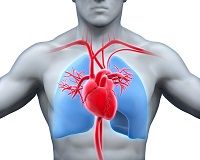Depression Increases Risk of Mortality Fivefold for Heart Failure Patients
Depression affects 20-40 percent of heart failure patients and is often linked to loss of motivation/ interest/confidence, lower quality of life, sleep disturbances, and changes in appetite with related weight changes.

For heart failure patients, depression was linked to a fivefold increase in mortality risk in a study presented at Heart Failure 2015 earlier this year. Patients without depression had an 80 percent lower mortality risk.
Researchers from the Imperial College London used data from the ongoing OPERA-HF study in order to assess depression in hospitalized patients with heart failure. There were 103 patients scored as not depressed, 27 patients with mild depression, and 24 patients with moderate to severe depression based on the Hospital Anxiety and Depression Scale (HADS D) questionnaire.
After an average follow up period of 302 days, 27 patients died. There was a fivefold increase in risk of death in depressed patients compared to patients with no depression or mild depression, the researchers found. After adjusting for factors such as sex, age, hypertension, severity of heart failure, and comorbidities, moderate to severe depression remained a predicting factor for all cause mortality in the patients. Patients with a low HADS D questionnaire score (indicating no depression) had an 80 percent lower risk of death.
The researchers expected to find the link between depression and mortality extends beyond the time patients are discharged from the hospital, they said. About a quarter of patients admitted to the hospital with heart failure are readmitted within a month for various reasons, they continued. Within a year, most patients will have had one or more readmissions and nearly half will have died, the researchers said.
“As doctors we are members of a caring profession and should be sympathetic to our patients’ plight but I am not in favor of immediately prescribing antidepressants,” study author John Cleland said in a press release. “Studies suggest that they are not effective in reducing depression in patients with heart failure. Clinicians should, however, screen patients with heart failure for depression and consider referring those affected for counseling.”
The authors added that depression affects nearly 20 to 40 percent of heart failure patients and is often linked to loss of motivation/ interest/confidence, lower quality of life, sleep disturbances, and changes in appetite with related weight changes. These factors could explain the link between depression and mortality found in the study population, the authors said.
“Our research clearly shows a strong association between depression and risk of death in the year after discharge from hospital,” Cleland concluded. “Recognition and management of depression may reduce mortality for patients with heart failure. More research is needed to find out what clinicians and patients themselves can do to manage depression. Better treatments for heart failure, comorbidities as well as depression itself may be required.”